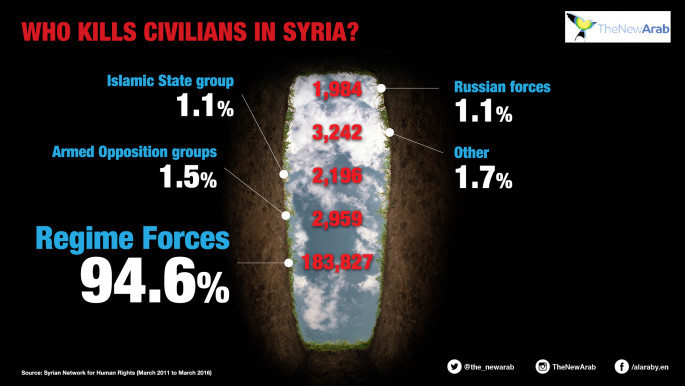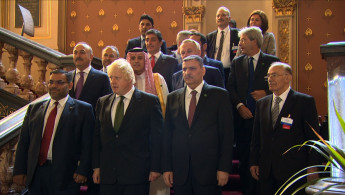Syria's path to peace, or the road to nowhere?
Syria's High Negotiations Committee head Riyad Hijab on Wednesday outlined a vision for Syria's transition from war to peace, running along the lines of previous Geneva communiques.
Hijab said he understood the mistakes of Iraq's 'De-Baathification' process following the 2003 invasion, which contributed to throwing the country into further chaos, and wants a future Syria to be based on mutual respect, justice and reconciliation.
He also said he wants to ensure that all Syrians - regardless of gender, religion or ethnicity - are equal in protection in law to avoid the outbreak of other sectarian-driven conflicts.
But with Damascus suburbs being ethnically cleansed, and the fact that Syria is ultimately divided into cantons run by Kurds, rebels, the regime and Islamic State group, these fears are perhaps already a reality.
High hopes
According to the first six months of Hijab's transition plan, Syria would see a truce established and the first round of talks begin. From there, the country could begin to return to some sense of normality.
In the following 18 months, Assad and his allies would step down from power, and Syria would make the transition from dictatorship to democracy.
Finally, the plan would end with parliamentary and presidential elections. The free Syrian state would make a new path to progress, with reconstruction of its battered infrastructure and a more inclusive economic system that delivered to all citizens and not just a powerful clique.
 |
Chief among obstacles to success is the opposition's demand that Assad should step down, which is roundly rejected by regime supporters |  |
This wouldn't, of course, bring back the estimated 400,000 dead - but would at least show their sacrifices brought about some significant steps on the road to freedom.
However, there remain many obstacles - some would say unsurmountable obstacles - before this is reached. Chief among these is the opposition's demand that Assad should step down, which is roundly rejected by regime supporters.
Whether this can be achieved will rely on the regime's supporters in Russia and Iran - but even to reach phase one, there must be a significant shift in attitudes.
"The plan which the HNC and Friends of Syria have come up with is excellent, but in order to get to that political point we have to have a cessation of violence otherwise it just becomes an intellectual debate," said Brooks Newmark, a former Conservative MP and ex-chair of the Friends of Syria parliamentary group.
Newmark said the plan unveiled on Wednesday was the same as that rolled out year-on-year, and which fails to acknowledge the realities on the ground.
This is unlikely to change while the West is unwilling to confront Bashar al-Assad, he added.
| Read more: Syrian opposition outlines peace plan, starting with 'truce' |
The day before the conference, opposition areas of Aleppo were again hit with chlorine gas, injuring dozens of children. It was an attack the Syrian American Medical Society described as "the new normal", with war crimes carried out with total impunity.
"The other side [the regime] don't seem to be taking these negotiations seriously. So I think we need to take a more robust approach to get to first base of seeing this excellent plan come about," said Newmark.
Ultimately, this would mean NATO would have to ignore Russian protests and enforce a no-fly-zone, he said.
"Until there is a recognition from the protagonist - really [President Vladimir] Putin - that they cannot win this war, only then will there be action."
Pushing back
Syrian regime forces have managed to claw back some recent losses in Aleppo, but the country still looks locked in stalemate.
Damascus might appear to have the upper hand militarily, but after nearly six years of fighting, the regime is weak and almost completely reliant on Russian airpower and Iranian-backed militants.
The economy, meanwhile, is shattered.
For many Syrians, the prospects of peace look distant, but as one opposition member told The New Arab, at least this transition initiative offers something positive and proactive.
There is also the hope among some Syrians that Democrat "hawk" Hillary Clinton will win November's US elections and change the status quo.
 |
|
| Click to enlarge |
Many in the opposition still remember that Clinton - as secretary of state - stood by in 2011 when the Syrian revolution kicked off and peaceful protesters were gunned down. But she has appointed Tim Kaine - a pro-opposition senator - as her running mate, and was responsible for the US "train and equip" programme as secretary of state.
Generally the mood in the opposition is becoming more positive amid the belief that a President Clinton would take a more robust approach to tackling the crisis than Barack Obama has.
There are also signs that the international community is growing increasingly impatient with Assad.
In March, while still Mayor of London, Boris Johnson cheered on the Syrian regime's victory over the Islamic State group in Palmyra with a Daily Telegraph op-ed entitled "Bravo for Assad" - but on Wednesday called for the president to step down.
He also wrote a robust condemnation of the regime for The Times of Assad.
"[Assad] is not a strongman, but a frighteningly weak leader who can never again hold his country together - not after the slaughter he has engaged in," wrote Johnson, now Britain's foreign secretary.
"The Syrian people will surely not feel safe as long as he is in command of the army, or able to send planes above their streets."
He went on to say that Russia's "seemingly indefensible" support for Assad must be challenged and made a shrouded pledge that he might support a no-fly-zone.
End game
Although Johnson would not be the first Western politician to condemn Assad, Britain's foreign minister has made himself a willing host for these first steps in a possible peace deal.
But even with another round of negotiations between the two sides in Geneva, it could likely end in dead-lock.
Riyad Hijab had earlier said that the Syrian regime had previously ignored prospects of talks with opposition officials in Switzerland, while the lack of political will from the US was partially a reason previous plans did not get off the ground.
 |
Kerry will be aware that previous truces have been used as downtime for the regime to build up its forces in key areas |  |
Chris Doyle, director of Caabu (the Council for British-Arab Understanding), also believes that while there is a long way to go, the plan at least offers an outline for how a future democratic Syria might be shaped.
"There's barely any flesh on the bones… we're a long way away from getting to a transition phase… but it is a vision that has been negotiated and chewed over," said Doyle.
"When the negotiators and various powers come to London to meet, the real debate is how to stop events on the ground from happening… but it is an important effort in getting activists, negotiators and politicians to look at what the future Syria might look like."
Later on Wednesday, US Secretary of State John Kerry said he would meet his Russian counterpart Sergey Lavrov about the peace plan in the coming days and initiate a ceasefire - ultimately the beginning of phase one in the intiative.
"We have not been able to reach a clear understanding on a way forward," said US state department spokesperson Mark Toner. "I can't say there is a big hope for success."
Yet Kerry will be aware that previous truces have been used as downtime for the regime to build up its forces in key areas such as Aleppo, to launch new offensives on the opposition.
Could a potentially more interventionist Washington change things?
"Many are waiting for a new US administration - where the presumption is if it is President Clinton she would certainly use more tools to assert an American presence," Doyle said.
"The international community can't be silent on this, but the problem is they are divided. The Russians are not prepared to allow a no-fly-zone to come into being… so I just find it difficult for this to come about."
Follow Paul McLoughlin on Twitter: @PaullMcLoughlin





 Follow the Middle East's top stories in English at The New Arab on Google News
Follow the Middle East's top stories in English at The New Arab on Google News


